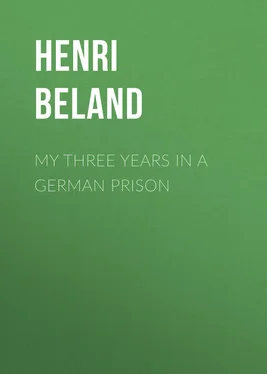Henri Beland - My Three Years in a German Prison
Здесь есть возможность читать онлайн «Henri Beland - My Three Years in a German Prison» — ознакомительный отрывок электронной книги совершенно бесплатно, а после прочтения отрывка купить полную версию. В некоторых случаях можно слушать аудио, скачать через торрент в формате fb2 и присутствует краткое содержание. Жанр: foreign_antique, foreign_prose, на английском языке. Описание произведения, (предисловие) а так же отзывы посетителей доступны на портале библиотеки ЛибКат.
- Название:My Three Years in a German Prison
- Автор:
- Жанр:
- Год:неизвестен
- ISBN:нет данных
- Рейтинг книги:4 / 5. Голосов: 1
-
Избранное:Добавить в избранное
- Отзывы:
-
Ваша оценка:
- 80
- 1
- 2
- 3
- 4
- 5
My Three Years in a German Prison: краткое содержание, описание и аннотация
Предлагаем к чтению аннотацию, описание, краткое содержание или предисловие (зависит от того, что написал сам автор книги «My Three Years in a German Prison»). Если вы не нашли необходимую информацию о книге — напишите в комментариях, мы постараемся отыскать её.
My Three Years in a German Prison — читать онлайн ознакомительный отрывок
Ниже представлен текст книги, разбитый по страницам. Система сохранения места последней прочитанной страницы, позволяет с удобством читать онлайн бесплатно книгу «My Three Years in a German Prison», без необходимости каждый раз заново искать на чём Вы остановились. Поставьте закладку, и сможете в любой момент перейти на страницу, на которой закончили чтение.
Интервал:
Закладка:
It was on August 25, if I remember well, that the first German air raid was made on the City of Antwerp. It is difficult to convey an idea of the manner in which this event filled the citizens with terror. The Zeppelins were then unknown to the ordinary population. Twelve civilians–men, women and children–were killed by the bombs dropped by the raiders. On the following morning there appeared in La Metropole, an Antwerp newspaper, an article advising the burial of the victims at a certain place in the city, and the erection of a monument bearing the following inscription: “Assassinated by the German barbarians on the 25th of August, 1914.”
The indignation of the public was great. The presence of German subjects in Antwerp had become impossible. Most of them, however, had by that time left the fortified portion of the city.
Every morning I used to bring with me to the hospital a copy of the London Times, and when we had a few moments of leisure the other physicians would gather around to hear the translation of the principal items of news.
Brussels was occupied by the Germans on August 18; Antwerp had now become the centre of the Belgians’ resistance; the seat of the Government and the general staff of the army had been transferred here.
In America one had not yet a full conception of the popularity of King Albert and of Queen Elizabeth among their subjects. Very few sovereigns enjoy to such a large extent the love and confidence of their people.
One day I had left the hospital and was running toward the wharves on hearing that a detachment of German prisoners captured by the Belgians was to pass that way. I shall never forget the spectacle offered on that occasion by the entire population of the city crowding the main streets and avenues to get a glimpse of these German soldiers, invaders of the sacred soil of Belgium. And it was while wending my way through the streets to get a nearer glimpse of the captives that more than ever I realized how the Belgians resented the insult inflicted upon them by the barbarian hordes. The prisoners looked tired and haggard; they were covered with dust and mud; the sight was pitiable.
When returning to the hospital I encountered, half way down a narrow street leading to the Cathedral, a group of small boys who were making an ovation in honor of a young lady, neatly dressed, and accompanied by a small boy eight or ten years of age. The boys were joined by adults, who continued to cheer the Queen and the Prince as they passed through the Place de Meir towards the royal palace. For it was the Queen and her son walking unostentatiously on the street. From every door and every window men, women and children continued cheering: “Vive la reine Elizabeth! Vive le petit Prince!”
In the last weeks of August and during the first three weeks of September, the Belgian troops concentrated in the fortified positions of Antwerp, and made several demonstrations against the Germans, who then occupied Brussels and Malines. At the hospital we were notified in advance of these sallies by the Belgian army, so that we might prepare ourselves to receive a fresh contingent of wounded the following day.
The wounded brought into St. Elizabeth Hospital were not, as a rule, very seriously injured, although at times and at first sight one would have believed them mortally injured. Happily, up to this date there had been no artillery attack on Antwerp. It is wounds resulting from artillery fire that are the most dangerous and the most frightful to look upon.
CHAPTER V
THE CAPTURE OF ANTWERP
It is out of question for me to try to relate in full justice the military events which attended the attack and capture of Antwerp by the Germans.
Divers histories of the war, published in French and English since 1914, have reported the principal phases and details of the memorable event. I will confine myself then to certain incidents which I witnessed, and in which I participated.
Antwerp, as is well known, was reported to be impregnable. The city itself is surrounded by walls and canals. In addition there was a first chain of forts known as inner forts, and another chain of forts known as outer forts.
About September 26 or 27, 1914, it became apparent in Antwerp that the Germans were making a serious strategic demonstration against the city on the side of Malines, situated half way between Antwerp and Brussels, and only five or six miles distant from the outer forts of Antwerp.
The military critics have often discussed the reasons which prompted the German high military command to undertake the conquest of the famous fortified position. It appears that what decided the Germans, more than anything else, to undertake the siege of Antwerp was the necessity to offset, in the minds of the German people, the painful impression created by the retreat of their army at the famous battle of the Marne. The Germans, you will remember, were forced to withdraw from both banks of the Marne between the 4th and the 12th of September, and a few days afterwards plans were made by the enemy to attack Antwerp.
Malines and a few villages on the south-west were first occupied, after which the attack was started against Antwerp through the outer forts on the south and south-east of the city.
The question was asked several times why did the Germans concentrate their first attack this way, when it would have been easier for them to capture the city by attacking from the west, whence they might have cut off any retreat of the Belgian army towards the North Sea. Between Thermonde and the frontier of Holland there is only a narrow border of territory which the Germans could have taken easily. It is still unanswered.
I have been assured that the Germans, after taking possession of a village named Hyst-Op-Den-Berg, had only to tear down the walls of a house to find, ready for use, a concrete base for a heavy and powerful piece of artillery.
Was this one of the numerous pre-war preparations of the Germans? No one can tell now, but it is a fact from this point the German artillery was able to bombard the forts of Waehlen, Wavre, Ste. Catherine and Lierre, which were the first ones destroyed.
At that time a large number of wounded soldiers were being brought to the hospital every day. Every time a new batch of wounded was brought in the doctors would, after rendering first aid, gather round in order to obtain some details of the progress of the battle. The reports became more and more alarming. The Germans were making their way steadily toward us. It was next reported that enemy detachments had crossed the Nete river; that in a short while the artillery would be able to bombard the city itself.
I remember particularly a lieutenant of artillery who was under my care at the hospital. He described to me the scenes which took place during the bombardment of the fort he occupied. He told me that although accustomed to the tremendous detonation of the guns, he could not find words to adequately express the effect of an explosion caused by the firing of a shell from a 28-centimetre howitzer or a 42-centimetre gun.
I think it was on Saturday, October 3, that the news spread like lightning that Mr. Winston Churchill, then First Lord of the Admiralty of Great Britain, had arrived in Antwerp. A few hours later we were told at the hospital that the English statesman had gone back, after assuring the Belgian authorities that help would be forthcoming immediately. As a matter of fact, on the days immediately following, British Jack Tars arrived in Antwerp. They crossed the city from l’Escaut to the forts on the south-west amid the indescribable enthusiasm of the population, and took position in the Belgian trenches.
The confidence of the people in the besieged fortress, which had become somewhat shaken, was at once restored and rose higher than ever. And I desire here to express my admiration for the conduct of the British naval squadrons, which was beyond praise. Their behavior and courage were alike unequalled, and whatever criticism may have been advanced in the British press at that time of sending these naval forces into Belgium, it is my sincere belief that these troops played an exceedingly important part. While they did not prevent the fall of Antwerp, they succeeded, at all events, in holding back the German advance for a time, and covered the Belgian army’s retreat, first through the city, thence to the other side of the Escaut, in the country of Vaes, toward St. Nocalos, Ghent, and Ostend. The British marines were the last to leave Antwerp. During the night of October 8-9 a small number of them fell as prisoners into the hands of the enemy; others evaded the Germans by crossing into Holland; the remainder followed in the wake of the Belgian army.
Читать дальшеИнтервал:
Закладка:
Похожие книги на «My Three Years in a German Prison»
Представляем Вашему вниманию похожие книги на «My Three Years in a German Prison» списком для выбора. Мы отобрали схожую по названию и смыслу литературу в надежде предоставить читателям больше вариантов отыскать новые, интересные, ещё непрочитанные произведения.
Обсуждение, отзывы о книге «My Three Years in a German Prison» и просто собственные мнения читателей. Оставьте ваши комментарии, напишите, что Вы думаете о произведении, его смысле или главных героях. Укажите что конкретно понравилось, а что нет, и почему Вы так считаете.











